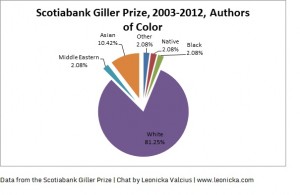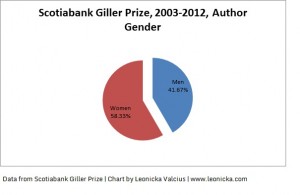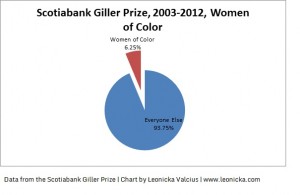Every time I do this I think I’ll be pleasantly surprised by the result. I think it’ll be better this time. And the Giller actually is. As the results below show, the Giller is slightly more diverse than the TD Canadian Children’s Literature Award and the Rogers Writers’ Trust Fiction Prize. But that’s not saying much. There seems to be unwritten rule that keeps authors of color at under 20% of the nominees.
As I look at more and more literary prizes, it becomes increasingly clear that Canada needs a prize just for people of color. But more on that later.
About the Scotiabank Giller Prize and my methods
“The Giller Prize was founded in 1994 by Jack Rabinovitch in honour of his late wife, literary journalist Doris Giller, who passed away from cancer the year before. The award recognized excellence in Canadian fiction… The Scotiabank Giller Prize is worth $70,000 (Cdn) annually. A purse of $50,000 is awarded to the author of the best Canadian full-length novel or collection of short stories published in English. Each of the finalists will receive $5,000.” For more information: http://www.scotiabank.com/gillerprize/0,,5813,00.html
As with the Rogers Writers’ Trust Fiction Prize, I looked at the nominees for the past ten years (2003-2012). With six nominees in 2011 and six nominees in 2004, there were a total of 52 nominees. Again, I only counted each author once, for a total of 48 unique authors. The raw data I collected is here for your review. Please alert me to any mistakes.
Results

Note:
Asian includes South Asian.

And, so you don’t get too excited about the representation of women among Giller nominees…

What is the solution?
A quick look at the 2013 longlist makes it clear that this year’s slate of nominees will not improve the overall diversity of the nominees.
So what will? What can literary prize administrators and juries do to diversify their nominees? They of course have to pick the best regardless of gender and ethnicity, and I can already hear them saying it’s not their fault if there aren’t enough authors of color in the submissions. Passing the blame is easy but these prizes have to take accept some responsibility. If, in fact, they aren’t receiving enough submission of work by people of color, they should examine their submissions guidelines, process, and overall image to figure out why.
And perhaps, if the Canadian literary community is truly committed to celebrating and rewarding literary excellence across Canada, there needs to be a prize only open to diverse Canadians.
What do you think? Join the conversation in the comments below and on Twitter using the hashtag #DiverseCanLit.


Great points, Laura! I agree that the publishing houses have a lot of responsibility but pinpointing where the issue “starts” is very much a chicken/egg scenario. After all, pub houses could easily say they don’t submit books by women or racially diverse people because they so rarely win. (The “diverse books don’t sell” line is used constantly, so it’s not a leap to think they’d use a similar excuse for prize submissions.) This issue definitely needs to be tackled from all sides.
I used to to take the “just look for a great book” approach to reading but in this post I explain why I changed my mind. The short version: bestseller lists, promotional material, bookstore shelves, and (as my reports show) book prizes, are skewed against diversity so I can’t rely on them to tell me which book is “good.”
I would have a question for the publishing houses: what are they doing to make sure that not only white writers are in the spotlight? because, in my humble opinion, the issue starts there, not with the prize organizations. they only take over what the publishing houses are pushing forward. as about segregating the prizes according to color/gender/etc., there is a big veto from me. it would only make things worse. I never buy a book because of its author, so I resent having the color/gender/ethnicity/or other such denominator pushed under my nose. a good book is a good book regardless who wrote it.
You raise two great points. 1) The modifier “of color” is slippery. It doesn’t encompass everything I need it to express but it is the best term I can think of (without resorting to “non-white”). I use the term in a broad, inclusive sense. I also emphasize self-identification. I used author bios and photos for my report, hoping that they reflect the authors’ self-identification. M.J. Vassanji’s bio was great because he clearly defined himself as “Other.” I would consider all the people you described in your comment people of color unless they did not want to be identified as such.
2) You’re right that having a separate prize for racially/ethnically diverse people (is that better?) could lead to CanLit prizes being LESS diverse. But that would only reveal discriminatory views they already held. No one would argue that the existence of The Women’s Prize for Fiction justifies the exclusions of women from literary awards. Similarly, anyone who would say “we don’t need to diversify our nominees because there’s already a DiverseCanLit Prize” exposes their bigotry. It would be nice to not need a separate award, but as we work toward that goal we need to create a way to recognize and reward talent.
Thanks for your comment!
Define writer of colour. I’m aboriginal but look like my French Canadian mother not my more native looking dad. Am I a person of colour if I’m look Caucasian but come from darker skin people. Another writer friend has an African father but she is blond-blue-eyed like her mother. Is she a writer of colour? I hear what you are saying but there are concerns with just an award for people of colour. Then that will allow literary awards like the Giller, etc., not have to think about this issue because there is an award for people of colour.